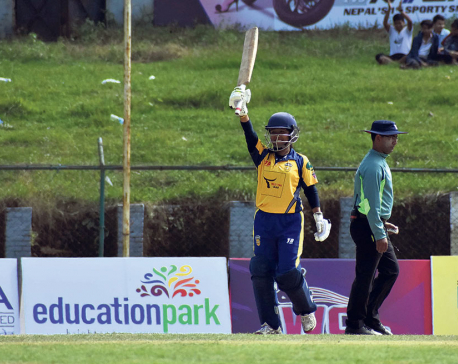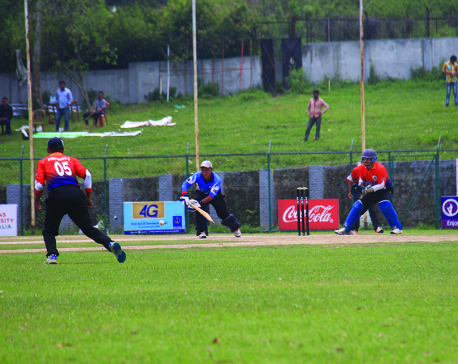
OR
Police investigation reveals 10 people were involved in spot-fixing in Nepal T-20 League
Published On: January 25, 2023 09:45 AM NPT By: Amrit Thapa

KATHMANDU, Jan 24: Police investigation has revealed that 10 people were involved in spot-fixing in the Nepal T-20 League that was held recently at the Tribhuvan University Cricket Ground.
According to the police, among the 10 people allegedly involved in fixing, four are Nepalis and six foreigners. Based on evidence collected from Whatsapp messages and phone call details, the police have already arrested two Nepalis involved in fixing. Among those arrested are 41-year-old Mehboob Alam, a former cricketer of Nepal’s national cricket team from Saptari and Mohammad Aadil Alam, a 20-year-old cricketer from Bara.
The Cricket Association of Nepal (CAN) had entrusted an Indian company named Seven Three Sports to organize the T-20 league, which courted controversy right from the beginning as it was organised at the expense of other domestic T-20 leagues of Nepal. CAN had banned all other domestic T-20 leagues of Nepal arguing that the country can have only one official T-20 league that is recognized by the cricket governing body of Nepal.
The Nepal T-20 League held from December 24 to January 11 not only put an end to other franchise-based leagues such as Everest Premier League, Dhangadhi Premier League and Pokhara Premier League but also struggled to pay the players on time.
Police investigation found that the people involved in fixing were those in the managerial role. They coerced the players to get involved in spot-fixing, an illegal activity in which a specific aspect of the game, irrespective of the final result, is fixed for the betting market.
The police said that they have received permission from the court to remand the two players in custody for five days.
Organising a press conference on Tuesday, the Central Investigation Bureau(CIB) of Nepal Police said that there was fixing in the T-20 league. The CIB started the investigation upon instructions from the Ministry of Home Affairs after the news about spot fixing made headlines during the league.
According to SP Sanjay Singh Thapa, the investigation has reached the final stage. According to the police, there were five proposals for fixing during the league. Among those five approaches, the players reported three proposals to the Anti-Corruption Unit of the International Cricket Council (ICC).
As per the ICC rules, the players should report to the Anti-Corruption Unit as soon as they receive any offer for fixing the match. The two players were arrested for not informing the Anti-Corruption Unit about the fixing proposal.
During the preliminary investigation of the police, it has come to light that Mehboob Alam, who is also a former national cricket player, tried spot fixing by offering financial incentives to at least two Nepali players.
Investigations revealed that Mehboob Alam approached Nepali player Mohammad Aadil Alam to throw one ‘no ball’ and one ‘wide ball’ and he did exactly the same in at least two matches he played.
“Besides a Nepali player being approached by a Nepali person, it has come to light that a foreign player was approached by a member of the management team for spot fixing,” said SP Thapa.
According to the police, the foreign player was involved in spot-fixing under the instructions of the team manager.
The CIB has said that Jatin Ahluwalia, the owner of Seven Three Sports company, is the mastermind behind the fixing incident in the Nepal T20 League. Betting and spot-fixing were suspected even before the league started. The police started an investigation after a complaint was lodged with the CIB while the league was underway.
Police were suspicious right from the beginning after it was revealed that the title sponsor of the Nepal T-20 league was 1-X Bet, a betting company.
As the main sponsor was a betting company, the police suspected that the source of financing for the league was betting. The CIB has made it clear that CAN is not directly involved in this league. But CIB has concluded that there was weaknesses on part of CAN.
You May Like This

Rhinos maintain winning streak to reach next round, Paltan eliminated
KATHMANDU, Oct 20: Kajal and Kanchan Shrestha shared an opening partnership of 71 runs to ensure Chitwan Rhinos defeated PokharaPaltan... Read More...

Chhetri brilliance inspires Kat Queens to 82-run win; Titans victorious
KATHMANDU, Oct 18: Nepal national women’s cricket team captain Rubina Chhetri scored the highest individual score of Women’s Champions League... Read More...

Khanal blitz propels Province 5 to a thrilling win over Gandaki
KATHMANDU, June 3: Saurav Khanal scored timely 90 runs to help Province 5 chase the highest target of the ongoing... Read More...




Just In
- CM Kandel requests Finance Minister Pun to put Karnali province in priority in upcoming budget
- Australia reduces TR visa age limit and duration as it implements stricter regulations for foreign students
- Govt aims to surpass Rs 10 trillion GDP mark in next five years
- Govt appoints 77 Liaison Officers for mountain climbing management for spring season
- EC decides to permit public vehicles to operate freely on day of by-election
- Fugitive arrested after 26 years
- Indian Potash Ltd secures contract to bring 30,000 tons of urea within 107 days
- CAN adds four players to squad for T20 series against West Indies 'A'














Leave A Comment